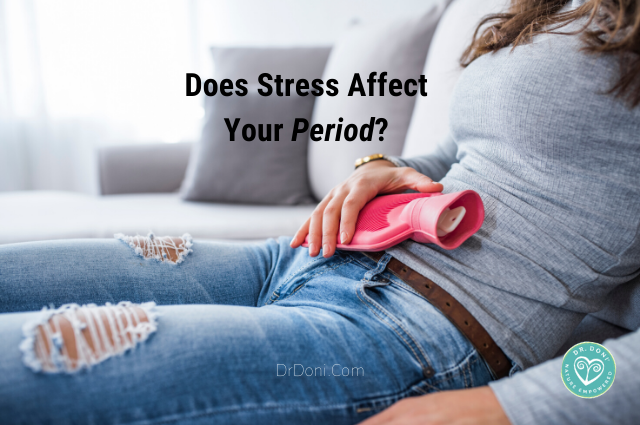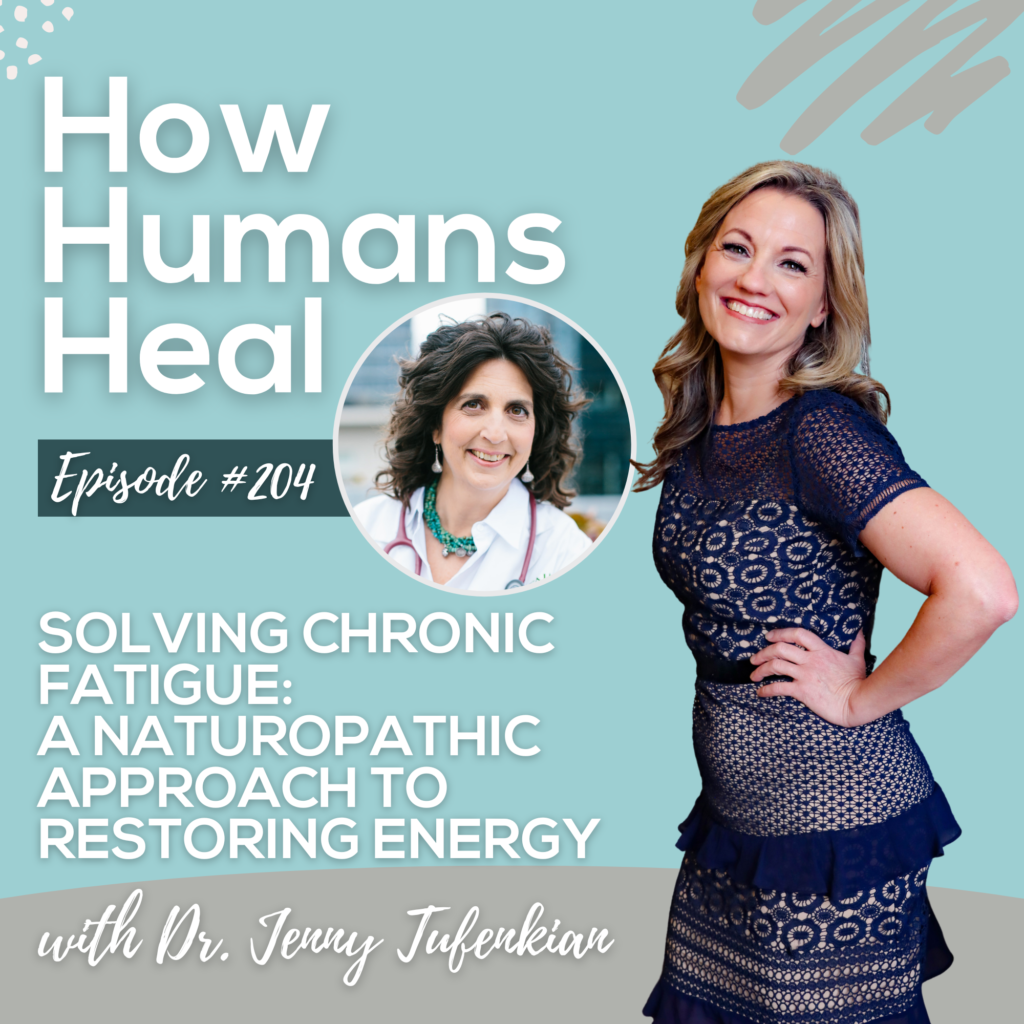
Does Stress Affect Your Period?
- Home
- Stress & Adrenal Fatigue
- Does Stress Affect Your Period?

Understanding how stress affects the menstrual cycle and causes hormone imbalances is the first step to a healthy period.

“Does stress affect your period?” This is a common question I get from patients.
Unlike a lot of questions I get asked, this is cut and dried: Absolutely, YES! In fact, more often than female patients realize, many of their hormone-related symptoms – anxiety, fatigue, sleep issues, and weight gain – are a direct result of an imbalance in stress hormones: Cortisol and adrenaline.
Our bodies and brains are always picking up on stress signals, and when they do, they shift the cortisol and adrenaline levels to too high or too low. That causes a cascade effect by buffering communication to the ovaries, which results in less optimal ovulation, lower progesterone, and changes in the metabolism of estrogen.
And in turn that can affect when, how, and if women have a menstrual cycle; as well as the length of the cycle, how they feel throughout the menstrual cycle, their ability to get pregnant, and peri-menopausal symptoms. It can also affect the likelihood of having an abnormal pap smear and HPV. (For more information on HPV, download my FREE guide to addressing HPV and Cervical Dysplasia, naturally.)
Perhaps we should start at the beginning…
Understanding the Menstrual Cycle and Your Period
Surprisingly for many, the menstrual cycle is actually four weeks long (or 28 days) – lining up perfectly with what we know of as a month and the cycle of the moon. This includes the period (often lasting about one week). There are two phases to a women’s menstrual cycle: follicular and luteal. They each last two weeks and are differentiated by the fact that progesterone is not present during the follicular phase (during period and the week after), while progesterone is present during the second two weeks (after ovulation) or luteal phase.
In this article, I’m going to tell you more about how the menstrual cycle is both determined by nature (just like the moon cycle) AND affected by stress in our environment. Essentially, we are living beings, responsive to the world around us.
Common Symptoms of Your Period
It’s not just a saying you know – hormones really are to blame for the chaotic pendulum of emotions (and physical symptoms) women experience during their period. And it gets even worse when there’s an imbalance.
Understanding how hormones become imbalanced, however, first requires you to understand how they work in the first place. On day one of the cycle, both estrogen and progesterone are very low. Within a few days or a week, estrogen starts signaling to the ovaries to begin maturing a follicle, which will develop into an egg to (possibly) be fertilized at ovulation (usually between day 14 and 16 of the cycle).
In the next phase, we begin to see the presence of progesterone, as it is produced by the ovaries after ovulation to counterbalance the estrogen levels and maintain a pregnancy (when present). Both levels begin to rise and then peak. This is typically when the “PMS” (Premenstrual Syndrome) experience takes place, which is more likely when estrogen and progesterone are out of balance. If a pregnancy is not present, progesterone levels drop dramatically, as do estrogen levels, triggering a period at day 28 (when hormones are in balance). And the cycle starts over again.
Common symptoms women experience with estrogen and progesterone imbalances are:
- Period comes early
- Period comes late, or skips a month
- Spotting before period
- No period
- Mood Swings
- Bloating
- Headaches
- Poor Sleeping Patterns
- Fibrocystic Lumps In Breasts
- Fatigue
- An Increase In Appetite
- Acne
- Breast Tenderness (or pain even)
- Weight Gain
- Heavy Period Bleeding
- Menstrual Cramps
- Decreased Sex Drive
- Abnormal Pap Smear Results
- Difficulty Getting Pregnant
- Hot Flashes and Night Sweats
- Anxiety and/or Irritability
Hormone Imbalance in Women
Often we hear about “estrogen dominance,” which is a way of saying estrogen levels are higher than progesterone levels. This scenario is common when we are stressed, and the ovaries are not making as much progesterone, or when we miss ovulation altogether, such as during peri-menopause (which can be between ages 40 and 55). I tend to put more of an emphasis on the low progesterone and ways we can increase it.
At the same time, we want to also pay attention to how your body is detoxifying estrogen, because all estrogen has to go through the liver and is either detoxified and leaves the body, or is recycled. Your genetics and stress exposure determines how well your body detoxifies estrogen. If estrogen is turned into more toxic metabolites by the liver, it can lead to symptoms we associate with hormone imbalance. Or if your body is flooded with adrenaline, it will be less able to manage estrogen effectively. And if estrogen is not able to exit through the digestive system (think constipation), that can lead to symptoms too.
Amazingly, we have figured out nutrients and herbs* that support these processes, so once we know where the imbalance or imbalances lie, then we can address them using nutrients and herbs. Folate, for example, and the other B vitamins are essential for processing estrogen; so is magnesium. If you don’t have enough (or perhaps have too much) of any of these nutrients based on your body’s needs and genetics, it can result in hormone imbalances and symptoms. This is particularly important for those of you with an MTHFR gene mutation, and/or COMT (like me).
Testing for Hormone Imbalance
To understand potential hormone imbalances, we need to understand specifically what is happening in your body. And to do that, we can do a urine panel referred to as the DUTCH test (it is not from Holland; it is from Oregon) which stands for Dried Urine Test for Comprehensive Hormones. This test (which became available just a couple of years ago – and thank goodness, because we need it!) makes it possible for us to see not just estrogen and progesterone levels, but the metabolites of the hormones.
This means we can understand your body SO MUCH BETTER.
A blood test for estrogen and progesterone is quite limited. It shows us the levels in the blood with a wide reference range. It is difficult to make heads or tails of it. But when we can see the urine metabolites, it’s like someone just turned on the lights. We can also see testosterone and DHEA levels, and how your body metabolizes them. And we can understand whether you need more or less progesterone, more or less estrogen, more or less help. detoxifying estrogen, and the various types of estrogen (there are 3 types).
After reviewing hundreds of these tests results from patients of all ages, I can definitively say that this test is a game-changer for women. I feel this is a test EVERY woman should do at least once every 5 years, and absolutely if you are experiencing symptoms that you think might be related to hormone imbalances. And if you are thinking of, or already are using bio-identical hormones, such as progesterone cream and/or Biest cream, this test is a must. It is easy to collect at home, and results are usually back to us within 2 or 3 weeks.
The other cool thing about the DUTCH test from Precision Analytical is that it can also measure your cortisol level, not just once or twice, but four times in a day (upon waking, a couple of hours later, evening and bedtime), so we can know exactly what role stress and the stress hormone are affecting your menstrual cycle. And then we can address any imbalances we find.
Because, here is the thing: Stress is the underlying cause of nearly all hormone imbalances.
What Stress Does to Your Period
When our bodies are stressed day in and day out – or suffering from adrenal dysfunction due to the daily burnout we experience without even realizing it – our bodies release unhealthy amounts of cortisol (either too much or too little for that time of day).
This is done simply as a self-preservation mechanism. Stress tells our body to protect us, and turn off non-essential tasks, such as ovulation. Except that if we never have a break from the stress signals, our ovaries never get a turn.
Cortisol Signals Our Bodies How to Respond
Elevated cortisol turns off ovary functions, disrupting normal hormone production. When these hormones are imbalanced, it can cause an irregular period, cycles that are too long or too short, amenorrhea (lack of period for months at a time), poor ovulation, and ultimately, fertility issues and what we think of as peri-menopausal symptoms.
Too low of cortisol is an issue too because again the ovaries are receiving mixed signals and subsequently not able to put out the hormones we need. Plus cortisol affects digestion, potentially leading to constipation and imbalanced gut bacteria, which circle back around to cause more hormone imbalances. Additionally, cortisol suppresses immune function, leaving us vulnerable to infections, such as HPV, vaginal yeast, and bladder infections.
And don’t forget that stress and cortisol disrupt our neurotransmitter levels, making anxiety, depression, fatigue, decreased memory, brain fog, and sleep issues even more likely. So what started as a busy stretch at work or stress from all the obligations of life, ends up creating a cacophony of symptoms that make you want to crawl into bed – and stay.
Let’s get you back to feeling your best by showing you what you can do to keep your hormones in balance.
Reconnecting to Rebalance Your Hormones
Since hormone imbalances are very often due to our bodies responding to stress exposure, the best way to solve that is by reconnecting with our bodies and NATURE to reduce stress.
In order to break the cortisol release, our bodies must feel like they are no longer under attack. That takes effort on our parts because unfortunately, we often don’t even realize we’re “stressed”… it’s just the norm.
Taking time to practice selfCARE (Clean Eating, Adequate Sleep, Reduce Stress, Exercise) can do this. You can work on this by:
- Setting time to do absolutely NOTHING! (Feels weird but try it.)
- Eating good-for-you foods.
- Drinking plenty of water.
- Sleeping 7.5-9 hours a night.
Additionally, people often underestimate the power of nature on our bodies… including the menstrual cycle.
Using Nature to Rebalance Your Hormones
Without even realizing it, our bodies respond to the sights and sounds of nature daily. Getting outside and breathing fresh air, looking at trees, getting light exposure during the day and moonlight exposure at night ALL help us to reconnect with our bodies.
When our bodies pick up on the signals of nature, they tell our ovaries to start working again, and in turn, producing the hormones necessary for healthy menstrual cycles, ovulation, and pregnancies.
Sometimes it truly does just come back to listening to our bodies, getting back to the basics, and reconnecting with your body with CARE.
Work With Dr. Doni
If you feel a hormone imbalance is the culprit of your health issues, let’s connect to get you back on track.
I created a Women’s Wellness Solution Program, which includes consultations with me, the DUTCH urine panel, as well as food sensitivity panel (to assess for leaky gut and foods as a source of stress), and a neurotransmitter panel. With all of that information, I guide you back to hormone balance. And not only that, I help you to know your body better, so you have the tools to keep your hormones on track for the rest of your life.
Our bodies don’t come with an instruction manual. So we need to gather information in order to know what they need. There is NOT something wrong with you (which is often what people tend to think). It’s just that you need better information to know what your body needs.
I’d love to invite you to sign up to save your spot for a FREE virtual/online conference all about women’s health and hormones that my colleague and friend, Dr. Brighten is putting on this next week. Sign up for the Take Back Your Hormones Conference With Dr. Jolene Brighten here!
–Dr. Doni
31st October 2019
*Please keep in mind that any and all supplements—nutrients, herbs, enzymes, or other—should be used with caution. My recommendation is that you seek the care of a naturopathic doctor (with a doctorate degree from a federally-accredited program) and that you have a primary care physician or practitioner whom you can contact to help you with individual dosing and protocols. If you ever experience negative symptoms after taking a product, stop taking it immediately and contact your doctor right away.
Share this Post:
Dr. Doni Wilson's Team
14 Day Detox Program
Take the Stress Type Quiz
Dr. Doni Social Media
Popular Posts


The 5 Burnout Types

Healing HPV Holistically: Dr. Doni on the Inspire Health by Jen Podcast

Recent Podcasts
Signup to receive our weekly newsletter with all the latest news, podcasts and special offers
New Book - Order Today!

SIMPLE PRACTICES for SHIFTING FROM YOUR STATE of STRESS to YOUR FLOW and FREEDOM
MASTER YOUR STRESS
RESET YOUR HEALTH
Order Now! Related Posts

What is making you susceptible to HPV?
I have been working with women who had abnormal cells on their cervix and/or vaginally, caused by HPV for over 20 years now. And while

The 5 Burnout Types
Did you know there are 5 burnout types? They are based on your Stress Type®, which is how your adrenal function has been affected by

Healing HPV Holistically: Dr. Doni on the Inspire Health by Jen Podcast
Dr. Doni was interviewed by Jen Ciszewski on the Inspire Health by Jen Podcast, talking about how to heal away HPV from your body for good.

Stress and Trauma: The Science Behind It, How It Shows Up and How to Heal: Dr. Doni on The Burn Fat and FEAST Podcast
Dr. Doni was interviewed by Sarah B. Thomas on the Burn Fat and FEAST Podcast, talking about the impact of stress and trauma on our health and what to do to recover from them.














